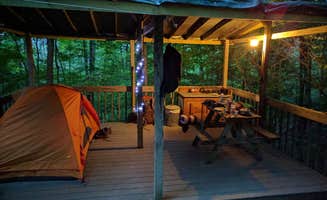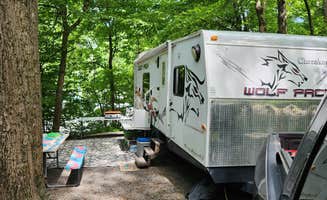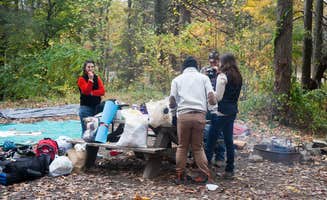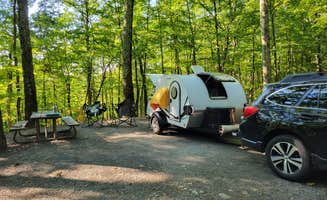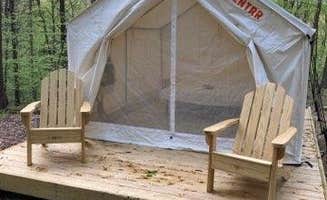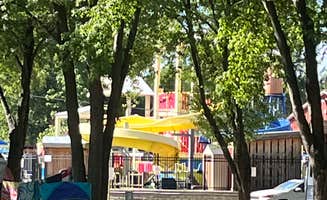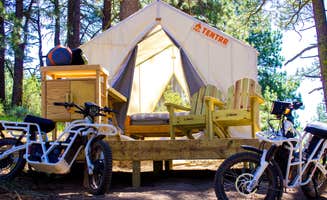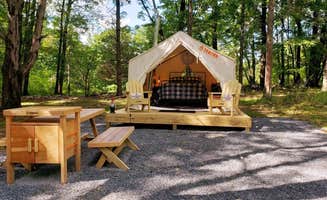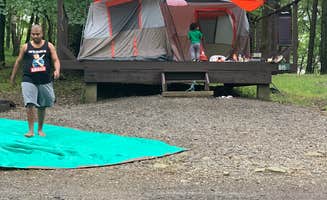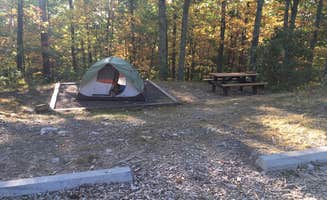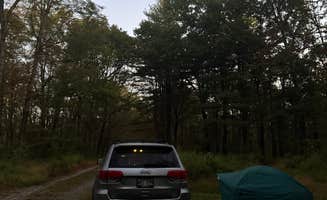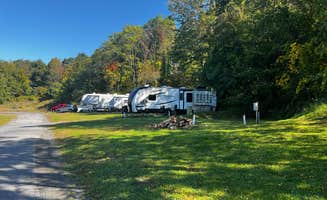Camping near Newburgh, New York offers diverse options within the forested Hudson Valley region, which sits at elevations ranging from 200-1,200 feet above sea level. The area experiences four distinct seasons with summer temperatures averaging 75-85°F while spring and fall nights can drop into the 40s. Local campgrounds typically operate from mid-April through October, with most facilities closing before the first significant snowfall.
What to do
Hiking trails access: At Clarence Fahnestock State Park Campground, campers can explore the 1.5-mile Pelton Pond loop directly from several campsites. "The campsites are secluded if you wanted more private camping (also super unique layouts) but there were plenty if you needed a quick stop over," notes Erinn N. The park connects to longer trail networks for more challenging hikes.
Fishing opportunities: Multiple ponds and lakes throughout the region offer fishing for bass and panfish. One camper at Fahnestock mentioned speaking with other visitors who reported "great fishing for catching panfish - one fisherman said he had caught several bass weighing over 3 pounds!" Most lakes require a New York fishing license, which rangers actively check.
Water activities: Beyond swimming, some parks offer boat rentals for additional water recreation. Winding Hills Park features a large lake for kayaking and fishing with a trail that circles the entire shoreline. "There is a large lake to kayak and fish in. NO SWIMMING. The lake is a nice size and has a trail so you walk the entire length with benches around a good portion to sit and/or fish," explains Amanda B.
What campers like
Accessibility to NYC: Many campers appreciate the region's proximity to urban areas while maintaining a natural setting. Harriman State Park's Beaver Pond Campground sits "about 30 minutes from sleepy hollow and tarrytown NY and only an hour to central park!" according to Megan B., making it ideal for city dwellers seeking weekend escapes.
Diverse site options: Campgrounds in the area offer everything from secluded tent platforms to accessible RV sites. At Beaver Pond, "The grounds are just steps away from Welch Lake, offering a lifeguard monitored sandy beach which is open during the summer season for swimming, fishing, and small boat craft further out," notes Steve W. Sites range from $15-45 per night depending on amenities.
Wildlife viewing: The region hosts abundant wildlife, though campers should practice proper food storage. "The wildlife do roam around your campsite so be mindful of putting food and garbage away before sleeping," advises a camper at Beaver Pond. Bear activity is common in several parks, with rangers providing specific guidance at check-in.
What you should know
Seasonal considerations: Most campgrounds close entirely from November through mid-April. Winding Hills Park operates "May 20 - Oct 10" with staff noting "Oct 22 was the last camping day of the season." Fall camping offers colorful foliage but cooler temperatures requiring additional layers.
Reservation requirements: While holiday weekends require advance booking, many campgrounds operate on first-come, first-served systems during weekdays. At Winding Hills Park, "Reservations are needed only for major holidays during camping season; Memorial Day, Fourth of July and Labor Day. Must book the entire holiday weekend 3 days ($90 for non electric sites add $5 each day for electric)."
Bathroom facilities: Quality varies significantly across campgrounds. One camper at Clarence Fahnestock noted: "I do feel the campground bathhouse really needed more attention... while it had clearly been painted this past year, it was very 'buggy' - and did not appear to have been thoroughly cleaned since spring... (yuck!)." Others report recently renovated facilities with hot showers.
Tips for camping with families
Kid-focused amenities: Families with children often prefer campgrounds with dedicated recreational facilities. Jellystone Park Gardiner offers extensive child-friendly options as "they have counselors who lead activities with kids in the summer and two pools plus a rock climbing tower, minigolf, basketball and a bounce pillow and more," according to Amanda S.
Noise considerations: Family campgrounds can be lively places, especially during peak summer weekends. Choose sites strategically based on proximity to playgrounds and facilities. One visitor to Jellystone Park noted, "Kids were at the playground 8 am or before and the noise woke us up. The kids were around until about 10:30 or so each night."
Budget planning: Additional activities beyond camping often involve extra fees. At some private campgrounds, golf cart rentals cost "$175 for 2 days and it only goes 5mph," according to one visitor, while shower fees at other facilities run about $3 for a 4-minute shower.
Tips from RVers
Hookup availability: Most public campgrounds offer limited electrical hookups but fewer full-service sites. The New York City North-Newburgh KOA provides comprehensive options, though "Some sites are hard to get into and others are in more of a large parking lot," according to April L.
Site selection strategy: When booking RV sites, carefully research specific site characteristics. "If staying here and concerned about branches I'd suggest one of the pull through sites. Specifically 138, 146 and 145 have a nice concrete patio and nicer firepit if you want to spend a little more. Also be cautious of the 'R' and 'S' sites...it's just a large gravel parking area with little to no shade."
Access limitations: Larger rigs face challenges at several area campgrounds. KOA camper Jason notes, "The sites were a little on the small side and stacked a lil closer than I like," while most state parks have tight turns and low-hanging branches that may limit access for larger motorhomes.


